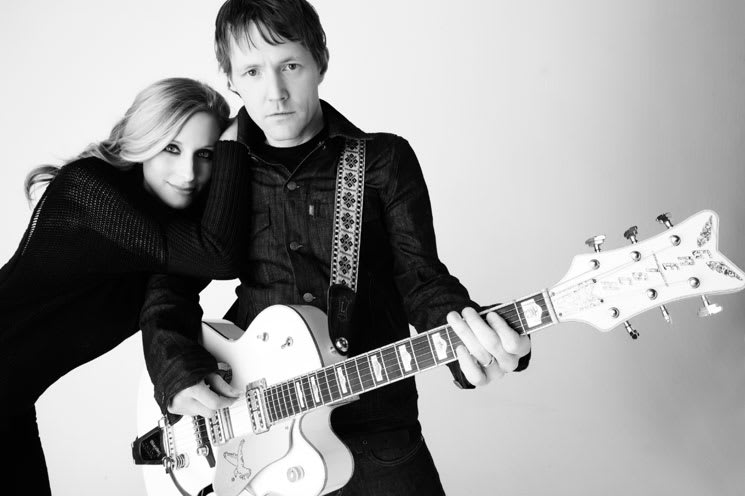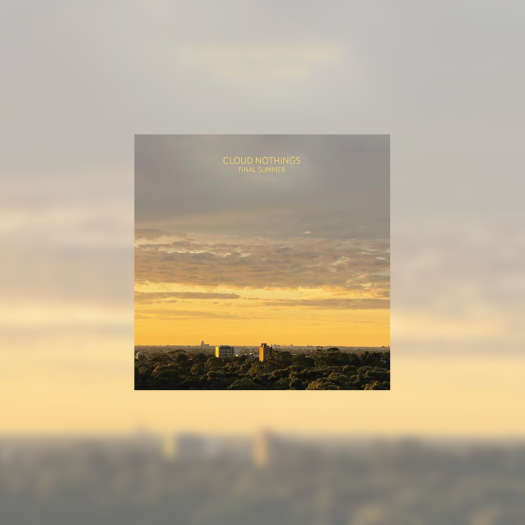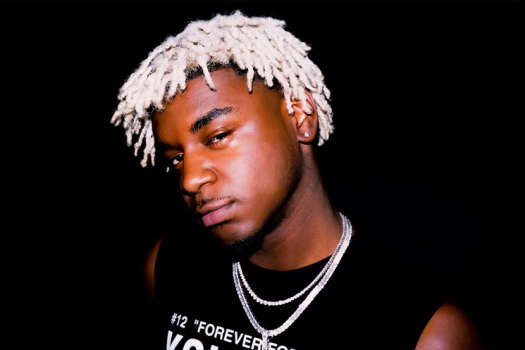When Luke Doucet and Melissa McClelland first formed Whitehorse in 2011, they were very adamant on remaining a duo both in the studio and onstage. But on their third album, Leave No Bridge Unburned — out February 17 through Six Shooter Records/Universal Music — they have finally opened the doors for their first outside collaboration, with producers Gus Van Go and Werner F.
The band met Van Go at the 2013 Polaris Music Prize gala, where their album The Fate of the World Depends on This Kiss was shortlisted for the award, but Doucet and McClelland had actually first discovered Van Go through an unlikely source: Broken Social Scene frontman Kevin Drew.
After receiving the entire Arts & Crafts discography on vinyl from Drew, the label's cofounder, Doucet became particularly fascinated with the Stills' 2008 album, Oceans Will Rise, which Van Go had worked on.
"There was something in the rhythm tracks, the bass and drums. When I heard that, I was like, 'Wow, this is such an epic record,'" Doucet tells Exclaim! "It couldn't be further away from the music that we've made. But we knew we needed to get somebody who could do those rhythm tracks, because I can't do that, and then we'd put the Whitehorse stuff on top and it would be awesome."
Luckily, Doucet and McClelland struck up a friendship with Van Go following the Polaris gala, and soon after, they began working on writing songs for Leave No Bridge Unburned.
"We can get trapped in our own bubble, so to have someone else calling the shots really pushed us further into the more epic drum sounds and that territory," McClelland adds. "And once we got a taste of that, we kind of dove right in."
The results are immediately noticeable on the album's opening track, "Baby What's Wrong," with its distinct foundation of rhythmic tracks, and continue to hold a strong, dramatic flair throughout the album on cuts like the stomping "Downtown" or the subtle sizzle of "Evangelina." Doucet clarifies that although the music evokes a more theatrical side of the band, the recording sessions themselves were drama-free, for the most part.
"It started out dramatic because at first, Gus asked us to show him some music, so we played him some songs and his reaction was to cancel the recording session and send us home to write 'real' songs," Doucet laughs. "He was like, 'These songs are terrible, go home and write real songs.'"
McClelland chimes in: "And we loved it! We wanted to get beat up because what's the point in having a producer if we're not going to get some passion? It was a really exceptional process that we had never really put ourselves through before."
As previously reported, Whitehorse have a pile of Canadian dates coming up, and you can see all those here.
The band met Van Go at the 2013 Polaris Music Prize gala, where their album The Fate of the World Depends on This Kiss was shortlisted for the award, but Doucet and McClelland had actually first discovered Van Go through an unlikely source: Broken Social Scene frontman Kevin Drew.
After receiving the entire Arts & Crafts discography on vinyl from Drew, the label's cofounder, Doucet became particularly fascinated with the Stills' 2008 album, Oceans Will Rise, which Van Go had worked on.
"There was something in the rhythm tracks, the bass and drums. When I heard that, I was like, 'Wow, this is such an epic record,'" Doucet tells Exclaim! "It couldn't be further away from the music that we've made. But we knew we needed to get somebody who could do those rhythm tracks, because I can't do that, and then we'd put the Whitehorse stuff on top and it would be awesome."
Luckily, Doucet and McClelland struck up a friendship with Van Go following the Polaris gala, and soon after, they began working on writing songs for Leave No Bridge Unburned.
"We can get trapped in our own bubble, so to have someone else calling the shots really pushed us further into the more epic drum sounds and that territory," McClelland adds. "And once we got a taste of that, we kind of dove right in."
The results are immediately noticeable on the album's opening track, "Baby What's Wrong," with its distinct foundation of rhythmic tracks, and continue to hold a strong, dramatic flair throughout the album on cuts like the stomping "Downtown" or the subtle sizzle of "Evangelina." Doucet clarifies that although the music evokes a more theatrical side of the band, the recording sessions themselves were drama-free, for the most part.
"It started out dramatic because at first, Gus asked us to show him some music, so we played him some songs and his reaction was to cancel the recording session and send us home to write 'real' songs," Doucet laughs. "He was like, 'These songs are terrible, go home and write real songs.'"
McClelland chimes in: "And we loved it! We wanted to get beat up because what's the point in having a producer if we're not going to get some passion? It was a really exceptional process that we had never really put ourselves through before."
As previously reported, Whitehorse have a pile of Canadian dates coming up, and you can see all those here.




